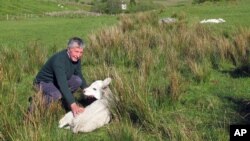Hugh Maguire can't believe the British really did it.
The Northern Ireland farmer, like many residents along the United Kingdom's virtually unmarked land border with the Republic of Ireland, faces the risk of financial ruin if Britain proceeds with plans to exit the European Union. EU farm subsidies provide most of his income from highland pastures of cows and sheep, around 80,000 euros ($90,000) annually to support his 241-hectare (600-acre) farm. He gets the subsidies under the EU's "Less Favored Areas'' rating, farms on marginally productive but environmentally valued land.
Maguire called last week's referendum verdict, with 52 percent voting U.K.-wide to leave the bloc, including 44 percent in Northern Ireland, "a disaster.''
"I can't see Britain subsidizing us the same as the EU has done,'' said Maguire, who voted to remain. "We've been much better off with the EU when we got the subsidies. ... I honestly think in a few years' time, there'll be no farming in this part of Northern Ireland.''
All along the meandering 310-mile (500-kilometer) border with the Irish Republic, residents are trying to imagine what life will be like if Northern Ireland, like the rest of the U.K., actually leaves the 28-nation EU. Both the U.K. and Ireland entered the then-European Economic Community together in 1973, and their cooperation at the European level helped to eliminate the border as a barrier to the economy or tourism by the early 1990s.
Many now fear that both British and Irish authorities will have no choice but to redeploy customs officers and police to deter immigration and smuggling, a prospect that could fuel renewed support for the outlawed Irish Republican Army. IRA attacks from the 1970s to 1990s spurred Britain to build border networks of bases and watchtowers manned by soldiers, but those installations have disappeared following the 2005 decision of most IRA members to disarm and renounce violence.
"For the sake of promoting peace and economic growth, we need to keep the Irish border as invisible as possible. Voters in England don't really understand what's at stake here,'' said John Paul Feeley, a county councilman born in Blacklion, a village of 200 bordered to the north and east by Northern Ireland.
Feeley said around 30,000 people travel daily across the border in both directions to attend jobs and schools, and the last thing they need is a return to traffic-snarling checkpoints.
"It's a very serious situation for us,'' he said.
The shock decision to back a Brexit sent the British pound tumbling against other currencies, including the euro used in the Republic of Ireland. The change means that southerners with euros in their pockets suddenly find shopping in Northern Ireland around 10 percent cheaper, while Northern Ireland-based companies that do business in pounds find imported goods growing prohibitively expensive.
"A lot of our customers are in Europe, and I think it's going to make it more difficult for us to compete in Europe,'' said Jonathan Balfour, director of Elite Electronic Systems, which employs around 200 people in the nearby Northern Ireland town of Enniskillen. The company assembles printed circuit boards and other electronic peripherals but finds its costs for imported materials are rising with the pound's sharp decline.
Other businessmen fear their supply chains will grow too difficult, with multiple tariff barriers, as they move goods from continental EU nations to the U.K. for eventual sale in EU member Ireland.
"I'm still in shock,'' said Joris Smet, a Dutch citizen who runs his own building supplies business in the Northern Ireland border town of Newry. He said many of his firm's goods were imported from Germany via the Netherlands and the Belgian port of Antwerp, then exported again to the Republic of Ireland. "So it's no surprise that I'm an avid supporter of EU membership. ... I cannot believe that people do not understand the obvious benefits to our economy.''
South of Newry, the Irish Republic city of Dundalk, 14 miles (22 kilometers) away, faces an exodus of retail trade to the north, where the weak pound means the euro enjoys boosted spending power. This last happened in 2007 and 2008, when Newry's shopping centers were inundated with cross-border shoppers.
"We've always lived with the currency fluctuations. Sometimes Dundalk wins, sometimes Newry wins,'' said Paddy Malone, spokesman for Dundalk Chamber of Commerce. "What we cannot live with is excessive border security.''
Malone gestured to the nearby M1 highway, which since 2007 has cut in half the travel time between the Irish capital, Dublin, and Northern Ireland's capital of Belfast. Currently, the only sign that a driver has passed from one nation to the other is that speed limits and distances in the Republic of Ireland are listed in kilometers, while the north uses miles.
"That road was built without any reference to border checks. Imposing them on what is supposed to be a high-speed, efficient piece of infrastructure would be difficult, to say the least,'' he said. "There's also hundreds of small roads and country lanes that cross the border, and it's impossible to police them all.''
"The British Army tried to seal off the border for years. They were never successful,'' he added.




